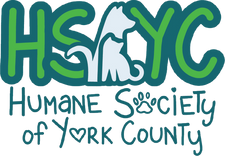To follow is the Animal Protection Laws in York County, SC. These are the minimum standards set for protecting pets/animals in York County. Most of the below laws pertain to the treatment of canines.
- Chaining / Tethering
- Chaining is NOT permitted unless owner remains with the dog at all times. A pen (recommended 100 sq ft for each dog), a fenced in yard, or a trolley system for the dog are all permitted. Chaining inside a pen is NOT permitted.
- Chains / Tether
- The requirements for any chains/tethers include....the chains/tethers must not weigh more than 10% of the dog's body weight. i.e.: a 40 lb dog can have a maximum 6 lb chain. Chain must be at least 10 ft long and cannot get tangled on debris and must have swivels on each end.
- Cold Temperatures
- Dogs and Cats get cold just like humans. Please bring your pets inside during extreme weather conditions. Otherwise, during cold temperatures (<50 degrees F) straw provides the best insulation and warmth. Please note blankets and towels absorb moisture and stay wet and cold and can freeze causing detriment to the pet.
- Collars
- All Pets must be suited with a collar at all times. Collars must be made of leather or nylon and must fit the dog's or cat's (breakaway collar required) neck comfortably and display the current rabies tag. For dogs, no metal collars, no chain collars, no prong collars and no choke collars are permitted except when dog is supervised by owner.
- Food
- Adult animals must be fed at least 1 time per day in a quantity to ensure minimum weight. Protruding rib bones, back bone, or hip bones indicate inadequate nutrition. Feed puppies and young animals more often.
- Hot Temperatures
- Dogs and Cats get hot just like humans. Please bring your pets inside during extreme weather conditions. Otherwise, please note that the inside of a dog house is hotter than outdoors and is not adequate protection. Shade is required to provide relief from the sun. Trees, tarps, covered roofs or other means can be used to block sun.
- Rabies
- A pet must have up to date rabies vaccination and tag worn on collar.
- Sanitation
- The pet living area must be free of debris, garbage, accumulation of feces, excessive mud or standing water.
- Shelter
- Each dog shall have a solid weatherproof structure that is appropriately sized for the size dog with an entrance portal that the dog can fit through. The walls and roof will have no holes, no leaks, no bugs, no flea infestation, and no water inside. Shelter will be elevated off the ground on blocks or legs (to prevent water from running into it) and will not be tilted at an angle. Barrels, makeshift wood boxes, metal cages or plastic transportation kennels are NOT permitted.
- Spay females
- Female dogs living outside must be spayed. This is reported to extend the life of the pet. Exception: if female dog is protected from having contact with male dogs at all times by keeping female in pen, fenced yard and/or keeping dog indoors.
- Trolley System for Dogs
- This system is like a clothesline which allows a dog to move back and forward without danger. A tree or a pole at each end holds up a cable (the trolley line). The trolley line must be 3 ft taller than the dogs head, minimum 10 ft long with add'l 2 ft on each end where a stopper will be attached (this will stop the dog from getting tangled around the tree/post, etc.... A minimum 10 ft long chain/tether (see requirements above) is attached to the trolley line. Periodically the trolley condition should be checked to be sure it is in good condition and secure.
- Veterinary Care
- Dogs and Cats must remain in good physical condition, rabies vaccination up to date, proper weight, no flea infestations, no fungus or yeast infections on skin, feet or ears, no open sores or wounds, no eye infections or other signs of ill treatment / neglect, and preferably spayed/neutered (contact your local no kill rescue for options).
- Water
- Fresh drinking water must be available at all times. Frozen, warm, muddy, slimy or stagnant water are not acceptable.
To report violations, call Animal Control at 803-628-3190; For Assistance call 1-803-980-DOGS.
